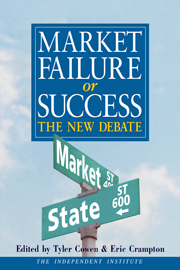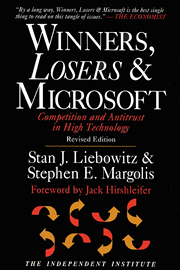Judge Penfield Jackson’s Findings of Fact is good news for Sun, Oracle, Netscape, and other Microsoft rivals who have learned the art of using the government to gain what they couldn’t achieve on their own in the marketplace. It is certainly bad news for Microsoft, but more importantly, it is bad news for consumers.
The Findings of Fact document is anything but the closely reasoned, dispassionate analysis that citizens and consumers deserve. It is worth recounting that this is the Judge who in 1997 issued an injunction prohibiting Microsoft from including a browser with the operating system even though the plaintiffs had not even asked for an injunction. This is the Judge at whom Microsoft thumbed its nose by interpreting his order literally, removing the browser files, and thereby offering consumers an operating system that wouldn’t work. And this is the Judge who was then overruled by an Appeals Court panel for his overzealous issuing of the injunction.
Consistency can be a virtue, but consistent muddled thinking is not. Start with his definition of the relevant market. Does the Macintosh belong in the same market as Windows PCs? Common sense tells us that they are substitutes. Note that mainstream publications such as Consumer Reports compare Macs to PCs, just as they compare Fords to Chevys. But the Judge, apparently unwilling to make even this minor concession, concludes that the Macintosh does not compete with Windows PCs. In his apparent zeal, his findings now threaten a large component of the computer industry. If the Macintosh is not a substitute for the PC, then the PC must not be a substitute for the Macintosh. Apple, therefore, must also be a monopoly since it has a 100% market share in its relevant market. And Sun must be one as well. This finding of fact may indeed wind up giving some of Microsoft’s rivals, at whose behest the case was brought, their just deserts.
The Judge states [sl1]that even if Microsoft could prove that its prices were at a competitive level, it would have no relevance to his finding of monopoly pricing! This puts Microsoft in the impossible position of being guilty regardless of their prices. Rather like the trials of old where the only way to prove that one’s was not possessed by the devil, was to sink to ones death.
The judge tells a tale that would have the Netscape browser become a competitor to the Windows operating system. This is because the browser provided a means for programmers to write programs that ran within the browser (actually, Java). The advantage would be that once a program was written for the Netscape browser, it could run on any computer that had Netscape Microsoft, we are told, to protect its ‘monopoly’ in the operating system, contrived to reduce Netscape’s market share to a level the Judge estimates to be 40% in 2001. He suggests that a market share of 40-50% is insufficient for Netscape to be a viable threat to Windows. He says Netscape needed to be the ‘standard’ in that market, so he apparently believes that some monopoly is good, if only it is name Netscape instead of Microsoft.
Although it is probably true that Netscape never was and never will be a viable threat to Windows, it is not for lack of market share. If programmers wanted to write programs to run in the Netscape Browser, as Judge Jackson claims, then surely 40% of the Windows market, plus Unix, Macintosh, and the other markets where Netscape is popular, would provide a potential market plenty large enough to keep programmers happily raking in revenues. If, that is, consumers wanted programs that ran in Netscape’s browser, which they probably do not since they run very slowly. The most glaring and important problem with the Finding of Fact is its discussion of consumer harm. The acid test of monopoly is that it hurts consumers, not competitors such as Netscape, Sun, or IBM. The Judge devotes a mere 5 out of 412 paragraphs to the issue of consumer harm. Although he states that consumer harm is “immediate and easily discernable,” what harms does he, in fact, discern? One is the extra disk space that the operating system takes up for capabilities that the consumer will not use (even though consumers have a large degree of flexibility about which components to load in). Another is that of parents needing to make the effort to remove the browser because they do not want their children to be able to browse the web (despite the fact that the browser contains parental controls to limit children’s use). But isn’t it common for virtually all computer applications (and many other products) to have some features that we do not use? Do I suffer monopoly harm because I have never gotten to use my rear window defogger in Texas? And doesn’t it take some effort for consumers to customize any product? You have to preset radio buttons, turn on lights, set clocks, and so forth. It is disingenuous for the Judge to claim that Microsoft harms consumers in any of these ways. Missing from Judge Jackson’s list of harms are any harms normally associated with Monopoly. Check out any economics textbook. You will find high prices and reduced output. Perhaps lower quality. Judge Jackson is virtually mum on these points except to acknowledge that Microsoft’s browser was very good and cheap.
These economic harms are not mentioned by Judge Jackson because there are none to be found. In our book, my co-author and I examined Microsoft’s impact on a broad range of computer software, and our results make clear why Microsoft’s competitors feel so threatened. Software prices fell by an average of 15% from 1985 to 1995, except in markets where Microsoft competed. Those markets experienced a 65% drop in prices. Spreadsheet and Wordprocessor prices were not falling until Microsoft’s products started to become the standard. Even in markets where Microsoft had attained a very large market share, such as midrange desktop publishing, it lowered its price.
Along with these price declines, we found that Microsoft became dominant only where it had the highest quality product, as measured by third part product reviews.
Magazine reviews clearly indicate that Microsoft’s products were considered superior to those of competitors. For example, comparison reviews of Macintosh spreadsheets covering a period 1986-1996 found Excel to be the best (or tied for the best) spreadsheet in 83% of the cases. Its average score in the MacUser reviews that we found was 4.78 compared to 4.2 for Lotus 1-2-3 and 4.5 for Resolve. The Macintosh version of Microsoft Word received a top rating in 60% of the cases where a statement was made about the best wordprocessor. Its average score since 1987 in MacUser was 4.21 compared to 3.7 for WordPerfect and 4.0 for MacWrite.
In the PC market Excel won (or co-won) 74% of the comparisons (28 of 38), but the leading spreadsheet, Lotus 1-2-3, squeaked out but a single win (3%) since Excel’s introduction. In comparison reviews that gave numerical scores, Excel won every time, except twice early on when it was found to be too slow because it ran under Windows (as opposed to DOS). Even in those cases, the reviewers giving it the low scores considered Excel to be the most capable spreadsheet if one had sufficiently powerful hardware. Similar results were found for Microsoft Word, although the judging is more complex since Microsoft had both DOS and Windows versions of Word. In the DOS world, WordPerfect appeared to deserve its dominant market share, garnering 52 % of the wins through 1992, whereas the second place product, Microsoft Word for DOS, garnered only 35% of the wins. When the market switched over to Windows, however, WordPerfect lost its footing. Out of 30 comparisons, WordPerfect was able to win only 2 (7%). Microsoft Word, on the other hand, won 16 (53%).
On the other side of the ledger, Microsoft Money only won 6% of comparison reviews of personal finance software since it came to the market, whereas Intuit’s Quicken won 70%. Not surprisingly, Intuit has retained its initial lopsidedly large market share in the Windows market, even though Microsoft’s product has had a lower price.
The fact that its applications such as Word and Excel enjoyed higher market shares in the Macintosh market than in the PC market demonstrated that its ownership of the operating system was irrelevant to its success. Is it any wonder then that the Judge, wishing to rule that Microsoft was a harmful monopoly, ignores the evidence on consumer harm? Microsoft’s low prices and generally superior products have not been good for its competitors, and it is easy to see why they want Microsoft stopped. Some of these firms found a pliant Department of Justice, willing to do their bidding so as to handicap what is probably the most competitive firm in the industry. Unfortunately, they seem to have found a judge who will do the same.










